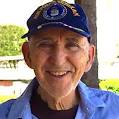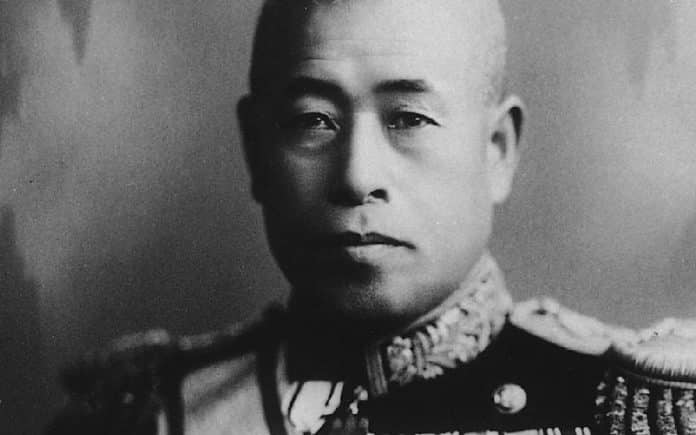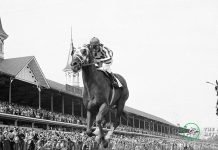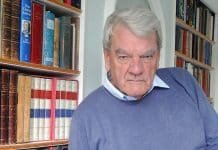
by Sherwood Ross
The story of the Japanese attack on Pearl Harbor that drew America into the Second World War is well known. What is not known is why Fleet Admiral Isokuru Yamamoto; 1884-1943, Japan’s brilliant naval strategist, and who could have retired, instead made the decision to participate in a war he personally opposed.
Yamamoto had studied at Harvard and later worked as the Japanese naval attache in its Washington, D.C., embassy and knew America very well and respected the United States. He knew Japan could not win a shooting war once U.S. industry geared up in support of the military. This play is about events in Japan leading up to Yamamoto’s decision.
This play has been read at Biff Malibu’s, Deadwood, S.D.; Playwright’s Workshop, Montreal, Canada; and the National Press Club in Washington, D.C. It won honors in national competitions sponsored by Riverside Stage, Wilton, Conn., and Theatre IV, Richmond, Va. “Yamamoto’s Decision” was published on the Internet on the literary website Chickasaw Plum – Volume IV – Number 2 – February 2007.
Those interested in producing “Yamamoto’s Decision” should contact Sherwood Ross at Suite 403, 102 SW 6th Ave., Miami, FL 33130 or by email at sherwoodross10@gmail.com
YAMAMOTO’S DECISION
© 2000 by Sherwood Ross
Note to Directors: “Yamamoto’s Decision” is a play with 12 characters that can be performed by eight actors, if some of the lesser roles are combined. Suggested roles that can be combined are those of Reiko and the Major’s wife; Major Matsui and the Waiter; and the Naval Minister and the Assassin.
Set in Japan in the Thirties, this work explores the conflict between conscience and patriotism. It is based on the life of Harvard-educated Admiral Isoroku Yamamoto, and excerpts from his poetry and letters have been incorporated in the dialogue.
Information that may be useful to the audience: Japan conquered Manchuria in 1931; attacked Shanghai, China, in 1932; invaded China, 1937; and attacked Pearl Harbor, the U.S. Naval Base on Hawaii, on December 7, 1941, bringing America into World War II.
“Our country! In her intercourse with foreign nations may she always be in the right; but our country right or wrong.” — Admiral Stephen Decatur, U.S. Navy, Norfolk, Va., 1816
CAST
(In order of appearance)
- Admiral Akio Matsushita, Retired, Yamamoto’s friend
- Waiter
- Admiral Isoroku Yamamoto
- Reiko, Yamamoto’s wife
- Yoko, Yamamoto’s lover, geisha house owner
- Tokuko, apprentice geisha
- Noburo Matsui, Army Major
- Assassin
- Major Matsui’s wife
- Naval Minister
- Fumio, Yamamoto’s aide
- General Hideki Tojo, Army Commander
ACT ONE, SCENE ONE
(Foghorn Sounds. Curtain rises on a cold, foggy night in a Japanese port city in 1934. Sound of water lapping against a pier. Foghorn. Akio at stage left looking through binoculars at the ocean. He wears western suit, overcoat, white silk scarf. The Waiter enters from stage right and peers out at the ocean. The Waiter is poorly dressed, wash pants and long-sleeved shirt and sandals. He shivers with cold. He sees Akio and approaches hesitantly.)
Waiter: Sir?
Akio: Yes?
Waiter: Can you see the fleet?
Akio: Not in this fog.
Waiter: The sailors will come ashore here, won’t they?
Akio: Yes, but not until midnight. You are waiting for…?
Waiter: (Proudly) My son. He’s on “Red Castle.”
Akio: Ah-h. (Looks at his wristwatch.) Man, you have a good four-hour wait. (Waiter nods. Waiter pulls cigarette package from his shirt pocket and fishes for a match.) Here!
(Akio: lights Waiter’s cigarette from his lighter.)
Waiter: Thank you, your honor.
Akio: What does your son do? (Foghorn)
Waiter: He signals the pilots when to land and take off.
Akio: An important job. Much responsibility.
Waiter: (Proudly) He sends half his pay home to his Mother.
Akio: You are fortunate to have such a son.
Waiter: Do you have a son in the navy?
Akio: No, I wait for a good friend.
Waiter: What is his position?
Akio: (Indulgent smile) Admiral.
Waiter: Yamamoto?
Akio: The very one. And he sends half his pay home, too. So your son and the Admiral have much in common.
Waiter: He is a very great man. (Beat) Say, I know who you are!
Akio: (Smiles) How can you?
Waiter: You say “good friend.” You must be Admiral Matsushita. I’ve heard of you.
Akio: Amazing! They can use you in naval intelligence.
Waiter: I am just a Waiter. (Foghorn)
Akio: Waiter or not! Oh, and I am former Admiral Matsushita, retired. (Removes a flask from his coat pocket and is about to drink but hesitates.) Join me in a li-ba- ah, in a friendly drink?
Waiter: Oh, no sir, your honor.
Akio: Come on. One slug against the chill!
(Akio: pushes the flask on him. Waiter accepts.)
Waiter: My wife will not believe this! (Drinks.)
Akio: Don’t tell her. Our secret.
Waiter: Ah-h! Isn’t this what they call Bourbon?
Akio: They sure do. Direct from the vat in Kentucky. Go on. (Waiter sips again.)
Waiter: America can’t be all bad.
Akio: Pretty much like anybody else, I suppose.
Waiter: (Beat) I worry if they make a war. “Red Castle” is sure to be in it, with my son right on the flight deck.
Akio: War may not come. The Admiral is speaking tomorrow against it. (Beat) Our future is a lot like this fog. (Shrugs.)
Waiter: I wish a man could see into the future, eh?
Akio: (Regarding the Waiter with respect for this observation.) Pointless to worry. Have another. (Waiter hesitates.) I’ll be hurt if you don’t.
Waiter: It is cold. (Drinks and wipes his mouth on his sleeve.) Thank you, your honor.
Akio: (Takes flask and has a long pull, then kisses it.) My one and faithful love.
Waiter: I read about you in Asahi.
Akio: And?
Waiter: There was much dispute when you quit. (Foghorn)
Akio: Fired. I did not quit. Booted out on my royal ass!
Waiter: I was sorry for you.
Akio: Well, don’t be! I knew what would happen if I refused a direct order. I have no regrets.
Waiter: Many in the Diet said you were right not to open fire on Shanghai.
Akio: Well, they found someone else to do it, didn’t they? (Waiter nods.) You know, you are remarkably well informed. Tell me, what is your name?
Waiter: Aki.
Akio: That’s my name, too. Shake!
Waiter: Yes, sir!
Akio: Drink to the two Akios. (They drink. Foghorn.)
Waiter: (Laughs) Less war, more whisky! (Foghorn.)
Akio: I like that. From now on, that’s my motto! (Drinks. The sound of a motor launch is heard faintly, then louder.) Sounds like the Admiral’s launch comin’. (Peers through his glasses.) Here she is. Enjoy your holiday, my friend Aki. (Beat) You must love your son very much to come so early.
Waiter: Yes, he means everything to us. (He shivers.)
Akio: (Calling off stage left.) Hi there! Isoroku! I’m over here! (To Waiter) They’re going to dock down the pier. (Removing his scarf.) Here, for my new friend, Akio! Keep warm!
Waiter: (Puts his hands up in gesture of denial.) Oh, sir!
Akio: Take it! (Wraps scarf around Waiter’s neck. Runs off left.)
Waiter: (Puts the scarf around neck and puffs himself up.) My wife will think I stole this from the cloak room. (Blackout. Foghorn.)
ACT ONE SCENE TWO
Place: Auditorium, Middle School, Nagaoka, Japan
(At rise: A curtain is drawn across the entire length of the stage except extreme left. We can see several boxes and ropes, suggesting backstage. In this tiny area, Yamamoto and Reiko are quarreling. Reiko is a tall, thin woman, dressed in the traditional kimono. Yamamoto is a short, powerful man. They are both in their mid-Fifties. He wears a white dress navy uniform studded with medals, white dress gloves; a ceremonial sword dangles from his waist.) LOUDSPEAKER: And now students, a very special treat. We are going to hear from our school’s most illustrious former pupil, Admiral Isoroku Yamamoto. (Applause.)
Reiko: Please, Isoroku, don’t go out there.
Yamamoto: I’ll only say a few words.
Reiko: Yes, and I know what you’re going to say and they’ll kill you for saying them!
Yamamoto: I will not shrink from speaking my mind!
Reiko: Fine, but please, don’t talk against war with America. They are going to make the war with you or without you.
Yamamoto: (He grabs Reiko by the shoulders and looks directly into her eyes.)
I thought you oppose going to war with them?
Reiko: Oh, I do! But don’t you say it.
Yamamoto: But there is no one else who will come out and say it. (Laughs) I’m the only clown in town.
(Yamamoto drops his arms and turns to start onstage but Reiko grabs at his uniform. By accident one of his medals comes off in her hand and she sinks to her knees clutching it.)
Yamamoto: Keep it for me, and stop worrying so much!
Reiko: (She stands up defiantly and throws the medal on the floor.) Isoroku, you’re a dead man!
(Yamamoto: strides to center stage in front of curtain. Totally self-possessed, he surveys the audience with just a trace of a smile and pauses before he speaks.)
Yamamoto: Thank you for inviting me. Only yesterday I sat where you sit now. I remember running here to the gym each morning before school, then running home for breakfast, then running back here for classes and then running home again at night. I hope you recognize what a fine school this is. It was born of sacrifice. In the last Civil War, the men of Nagaoka, my father included, fought like true samurai for their beliefs. Unfortunately, they did not prevail. The victors treated Nagaoka harshly. Our people suffered much hardship and hunger. After a time, though, the victors sent them a shipment of rice, enough to put three meals on the table of every family. But the elders did not distribute the rice. They were men of vision. Instead of eating the rice, they sold it and used the money to build this school. They sacrificed for us. What I learned here enabled me to win a scholarship to the Naval Academy at Eta Jima. My classmate, Akio Matsushita, also became an admiral. In fact, he graduated first in our class at the Academy. So you can take the knowledge you learn here and go anywhere in the world. Today, we live in troubled times. There is war in China and talk of war with America, which I hope will never come. I lived and worked in America. I studied at Harvard University, and I know the American people. Those who want to fight America call them luxury-loving and soft, people with a shallow culture who will not fight. This is a mistaken belief. Americans are not weak and they are filled with the spirit of justice. Lindbergh’s solo flight across the Atlantic is the sort of act that is normal for Americans — an adventure based on science. As Japan cannot defeat America militarily, Japan should not fight America. Those of you who learn the lessons of history will avoid errors of this sort. So study hard, sacrifice for the future as our fathers sacrificed for you, and whenever you can, run both ways to and from school.
(Flash bulbs pop. Applause. Yamamoto salutes the audience, executes a smart left face and strides directly into the kitchen of his home with no break in the action. Reiko, his wife, follows him angrily.)

Sherwood Ross is an award-winning reporter. He served in the U.S Air Force where he contributed to his base newspaper. He later worked for The Miami Herald and Chicago Daily News. He contributed a weekly column on working for a major wire service. He is also an editorial and book publicist. He currently resides in Florida.
ATTENTION READERS
We See The World From All Sides and Want YOU To Be Fully InformedIn fact, intentional disinformation is a disgraceful scourge in media today. So to assuage any possible errant incorrect information posted herein, we strongly encourage you to seek corroboration from other non-VT sources before forming an educated opinion.
About VT - Policies & Disclosures - Comment Policy




